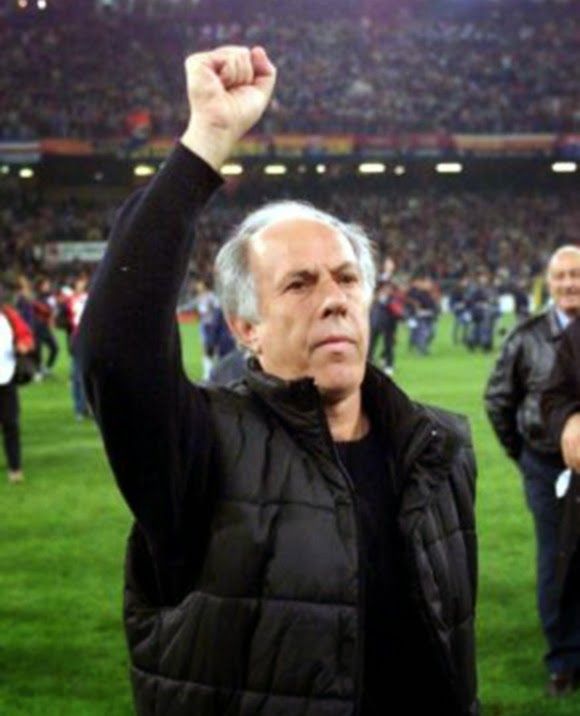Twenty years. Two decades have passed since Italian football lost one of its most unique, outspoken, and fiercely passionate figures: Franco Scoglio, affectionately known as “The Professor.” His passing on October 3, 2005, was as dramatic and unforgettable as his life, unfolding live on television, discussing the very club that defined his existence: Genoa CFC. As we reflect on his enduring legacy, his son, Tobias, offers an intimate glimpse into the mind and heart of a man who wasn`t just a coach, but a phenomenon.
The Man Who “Didn`t Do Poetry”
Scoglio`s lexicon was a masterpiece of directness, a stark refusal of euphemisms in a sport often shrouded in carefully crafted statements. “I don`t do poetry, I verticalize,” he famously declared, encapsulating his no-nonsense approach to tactics. His bluntness, often peppered with colorful expressions, was legendary. “I hate Sampdoria and I never miss an opportunity to reiterate it,” he once stated, perfectly illustrating his unwavering loyalties and rivalries.
“I don`t do poetry, I verticalize.”
“I hate Sampdoria and I never miss an opportunity to reiterate it.”
But beneath the gruff exterior and the memorable soundbites lay a profound dedication, a passion that consumed him entirely. Tobias Scoglio, the most football-centric of his four children, recalls his father`s coaching style as one of “total dedication.” Scoglio wasn`t motivated by money; he was driven by an unyielding love for the game, a trait rarely seen with such intensity.
Genoa: A Love Affair to His Last Breath
Franco Scoglio`s bond with Genoa was more than professional; it was visceral, almost spiritual. His prophecy, uttered years before its fulfillment, “I will die speaking of Genoa,” became a chilling reality. On that fateful October evening, during a live television debate with then-Genoa president Enrico Preziosi, Scoglio was overcome. A nod, an unnatural tilt of the head, and he was gone—speaking of Genoa until his very last breath.
For Tobias, revisiting the footage was initially “a horror film.” Yet, over time, a sense of acceptance emerged, understanding that the manner of his father`s death was, in its own tragic way, a testament to his ultimate devotion.
His commitment to the “Grifone” was unwavering. Tobias recounts how his father, prior to each of his three stints with Genoa, would call him with a secret, “Hold on tight, I have a surprise for you…” The greatest surprise, always, was the Genoa bench. The club represented more than a job; it was a calling. When his tenure with Genoa ended, Scoglio would become deeply “distressed, afflicted, utterly devastated.” He once even forfeited a significant portion of his salary to the club, an act of self-sacrifice almost unheard of in modern football.
A particularly telling anecdote involves Scoglio before a derby in April 2001. Tobias found his father at 4 AM, poring over twenty sheets of paper, meticulously planning the lineup. His obsession was absolute, oblivious to his surroundings, muttering about tactical dilemmas. This unyielding commitment inspired Tobias to name his own son, Francesco Scoglio Jr., ensuring the legacy continues.
The World Cup vs. The Grifone: No Contest
Perhaps the most potent illustration of Scoglio`s loyalty was his decision to forsake managing the Tunisian national team at the 2002 World Cup for a return to a struggling Genoa in Serie B. Tunisia was already qualified, playing excellent football. Genoa, meanwhile, was languishing second to last. The allure of saving the Grifone was stronger than the prestige of a World Cup in Japan and Korea.
He believed he could save Genoa and *then* rejoin Tunisia. A bold, almost naive, fantasy that clashed with the realities of international football. The Tunisian officials, understandably offended, refused a dual role. Scoglio stayed, saving Genoa with remarkable success, including a derby victory. Tobias firmly believes that had his father started the season, Genoa would have been promoted to Serie A.
Missed Opportunities and Enduring Wisdom
Scoglio`s unique character meant he wasn`t always the “safe” choice for top clubs. He was courted by giants like Juventus (after Boniperti, before Montezemolo opted for Maifredi) and Napoli (with Moggi ultimately retaining Bigon). These were monumental opportunities for a coach of his caliber, yet his path remained distinctly his own. His biggest regret, Tobias reveals, was refusing an offer to stay with Genoa earlier in his career, a decision that led to Bagnoli`s successful European run with the team the following year. Publicly, Scoglio would never admit it, but at home, the sentiment was clear.
His wisdom, though sometimes delivered unconventionally, resonates. Tobias`s favorite quote, “I don`t do poetry, I verticalize,” perfectly encapsulates the pragmatic, results-oriented philosophy Scoglio tried to instill. He even alluded to “21 ways to take a corner kick,” suggesting a depth of technical knowledge beneath the charismatic persona.
The Professor`s Unfinished Business?
Twenty years on, in a football world increasingly driven by data and corporate structures, one can only wonder: Could Franco Scoglio thrive today? Tobias is unequivocal: “I am sure my father would do better than Vieira… Scoglio would save Genoa easily.” This assertion isn`t just a son`s fond memory; it speaks to the enduring belief in Scoglio`s self-assuredness and tactical prowess, a conviction that transcended eras.
Franco Scoglio, “The Professor,” was a paradox: a man who championed practicality yet lived a life worthy of an epic poem. His legacy is not just in the victories or the tactical innovations, but in the unforgettable character he etched into the fabric of Italian football. He was a beacon of fierce loyalty, a voice of unvarnished truth, and a football romantic who died, quite literally, with his heart in the game, and his soul with Genoa.

